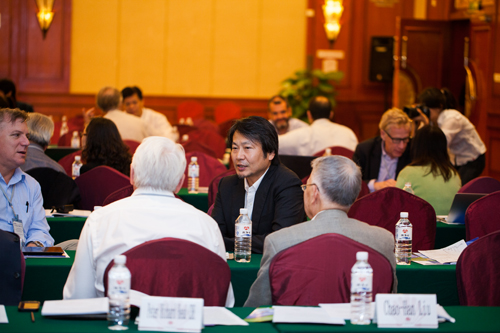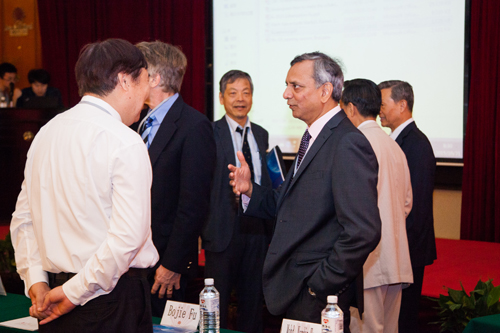Co-design for Urbanization in China and Asia-Pacific
Date:2015-10-28
China and Asian-Pacific regions are experiencing the most rapid urbanization which impacts environmental quality through high intensity discharge of waste, landscape changes and altered biogeochemical cycling of carbon and nutrients. However, urban systems are complex and their development is never managed by a single institution or level of government. A sophisticated understanding of multi-layer and multi-sectoral decision making is therefore needed to facilitate the quickest possible moves towards sustainability.
An International Symposium on Co-design for Urbanization in China and Asia-Pacific Region, under the framework of CAS International Cooperation Project on “Co-design of Implementation Plan for Future Earth in China”, was held in Xiamen, China from 20th to 23rd October, 2015. The word “co-design” refers to a multidisciplinary research method which involves all stakeholders at the designing stage of sustainable research. Different from traditional linear research method, it is an essential part of the “Co-design, Co-produce, Co-deliver” approach advocated by Future Earth (FE), a ten year international program providing the knowledge and support to accelerate our transformations to a sustainable world. The approach is to ensure that knowledge is generated in partnership with society and users of science.
Bearing this in mind, the Symposium brought together representatives from natural and social sciences, governments, funding agencies and other stakeholders including medial doctors, media and architects to develop a set of co-designed research priorities and working partnerships that could deliver to urban development in China and the Asia-Pacific Region.

The non-traditional Symposium brought scientists and stakeholders into one room to talk to each other. (Photo courtesy of LI Jin)
The cross-disciplinary discussions centered around “urban systems dynamics and rural-urban linkages to inform development strategies for sustainability”, “impacts of urbanization on climate change and of climate change on cities”, “linking adaptation and mitigation actions for climate resilient, low carbon cities”, “drivers of ecosystem health and human wellbeing in urban environments” and “social and institutional responses for urban sustainability transitions”. Chaired by Prof. Guoxiong Wu from IAP/Chinese Academy of Sciences, the plenary session covered a wide range of topics, including plans for urban research under the umbrella of FE, suggestions for low-carbon urbanization, urban resilience planning and urbanization’s ecological effects delivered respectively by Chair of FE Science Committee Dr. Mark STAFFORD-SMITH, Vice Chair of CNC-FE Prof. DU Xiangwan, Chief Executive Officer of the Ecological Sequestration Trust Prof. HEAD Peter and Vice Chair of CNC-FE Prof. FU Bojie.
A Statement following the fruitful discussion will be issued after the Symposium. It will help better understand how people value nature, culture and social inputs and how to include all values, including ‘hidden’ costs/benefits, into monitoring and assessment of alternative urbanization pathways at different scales.

Paul Shrivastava, the Executive Director of Future Earth, talked to CAS member, also the vice chair of CNC-FE Prof. FU Bojie (Photo Courtesy of LI Jin)
Nearly 100 attendees spread across Future Earth, Chinese Academy of Sciences, Chinese Academy of Engineering, Chinese Academy of Social Sciences, China Association for Science and Technology, Chinese National Committee for Future Earth, China Meteorological Administration, Xiamen Municipal Government, Tongxiang Municipal Government, Ecological Sequestration Trust, ICSU Regional Office for Asia and the Pacific, ICSU-IAMP-UNU Programme on Urban Health and Wellbeing: A Systems Analysis Approach , Australian National University, Guangzhou Pearl River Foreign Investment Architectural Designing Institute Ltd., University of East Anglia, Stockholm University, Academia Sinica, Université de Versailles St-Quentin-en-Yvelines, Research Institute for Humanity and Nature, United Nations University, and Tencent Research Institute. It was hosted by CNC-FE, located at the State Key Laboratory of Numerical Modelling for Atmospheric Sciences and Geophysical Fluid Dynamics (LASG), Institute of Atmospheric Physics, Institute of Urban Environment and Fujian Association for Science and Technology. Vice President of CAST, Member of FE Science Committee and Chair of CNC-FE Prof. QIN Dahe, Deputy Secretary-General of the CAS and the Director General of the CAS Bureau of International Cooperation Prof. TAN Tieniu, Senior Vice-Mayor of Xiamen Municipal Government Mr. ZHENG Yunfeng delivered the welcome address.
The symposium was also supported by CASAD Consultation Project on Sustainable Development.
Background:
Future Earth is a 10-year international research programme launched in June 2012 that will provide critical knowledge required for societies to face the challenges posed by global environmental and climate changes and to identify opportunities for a transition to global sustainability. CNC-FE was formally established on 21 March, 2014 with its secretariat hosted by LASG/IAP, CAS. In March 2014, CAS funded “Co-design of Implementation Plan for Future Earth in China” under the framework of International Cooperation Program of Bureau of International Cooperation, CAS. At the joint workshop with FE Science Committee and interim Engagement Committee in early June 2014, CNC-FE was encouraged to establish international collaboration with Asian-Pacific countries to address the scientific challenges of FE, in particular, dealing with urbanization, low carbon, air pollution and health problems in the region. After interacting with FE Science Committee and other partners, it was decided to hold the international symposium on “Co-design for Urbanization in China and the Asia-Pacific Region” in Xiamen, China.
More information please see: http://cnc-fe.cast.org.cn/ISCUCA/index.asp
(from LASG/IAP)
